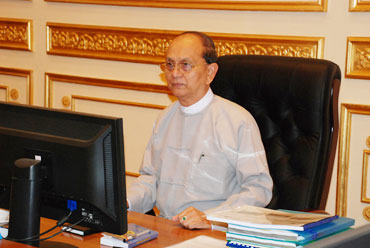Burma’s President Thein Sein has proposed opening schools to improve the education of minority Rohingya Muslim children.
 Burmese President Thein Sein Photo: President's officeThein Sein said education is an important tool to help different communities live in harmony and respect human rights, in an interview with the VOA Burmese Service published on Tuesday.
Burmese President Thein Sein Photo: President's officeThein Sein said education is an important tool to help different communities live in harmony and respect human rights, in an interview with the VOA Burmese Service published on Tuesday.
He said “Bengalis” – his term for the Rohingya – have only religious schools and lack “proper education.” Education for most Rohingyas stops at around age seven, say observers.
“So we will open schools for them and give them modern education,” he said. “And once they become educated, they will be more thoughtful and can decide what is right and what is wrong.”
Thein Sein reiterated Burma's opposition to any foreign investigation of the recent deadly community violence between Rohingya Muslims and Rakhine natives in western Rakhine State where up to 90 people have been killed and thousands of homes and businesses burned.
The Saudi-based Organization for Islamic Cooperation has called for a credible investigation of the violence, which it has described as a case of prejudice against the Rohingya, who are denied citizenship in Burma.
President Thein Sein said the government is giving assistance to the victims of the violene, both Muslim and Buddhist, and has asked the government-appointed Burmese Human Rights Commission to investigate the unrest. There is "no need" for a foreign group to investigate the violence as an international issue, he said..
UN human rights envoy to Burma, Tomas Ojea Quintana, last week called for the Burmese Parliament to investigate the unrest in Rakhine State.
Mabrur Ahmed, the cofounder and director of Restless Beings, a British-based rights group following the Rohingya situation, told VOA he welcomed the Burmese president’s school pledge but warned of segregation.
“I don’t think it’s productive for a community where there’s going to be two ethnicities living side by side and they have separate schools for each set of children. But at the same time, at the moment, the Rohingya children are not receiving any education, or very limited education up to age seven, so to have access to more education is obviously a good thing,” he said.
Ahmed said without citizenship, the Rohingya and other unrecognized ethnic minority groups are not able to own land, get married or have children without state permission.
“Generally, the whole law needs to be overlooked [reviewed] where everyone has equal rights and there isn’t this separation of ‘pure breed’ Burmese and ethnic minority Burmese and hereditary Burmese,” he said.
Ahmed told VOA that Burma’s transition from a military-led to a semi-democratic civilian-led government is a “good, positive” step, and the president’s interview is a further sign of change.


